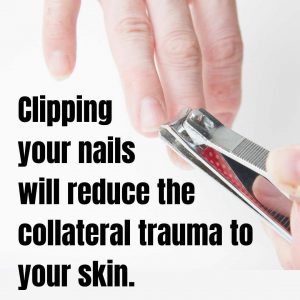- Best ResultsDepends on insight
- Treatment Recovery2-12 months
- Procedure TimeNA
- Skin SpecialistPsychiatrist, psychologist
- Duration of ResultsCan be permanent
- AnaestheticNA
- Back to WorkNA
- Cost$
Skin Picking Disorder: Psychological management
Skin picking disorder, also known as neurotic excoriations or dermatillomania is a common psychological condition that presents as skin picking. It affects 5% of the population. If patients have insight, skin picking is easily treatable. Early & effective management will mitigate permanent scarring. Simple psychological exercises can have a massive impact on skin health. Proper wound care will markedly reduce scarring.
FactsFacts on psychological management of skin picking
- Excoriations or picking is a very common condition affecting 5% of the population
- It can be due to acne, a condition known as acne excoriee (separate entity)
- Dermatillomania, skin picking, neurotic excoriations do not have primary lesions
- Picking can be localised to skin, hair, or the nails/cuticles
- Treatment should be directed at the skin as well as subconscious behaviour
- Skin directed treatments include hydrocolloid dressings, wound care & medical phototherapy
- Behavioural modifications include CBT & habit reversal therapy
- If you cannot stop picking, professional help is encouraged
What is skin picking disorder or dermatillomania?
Put bluntly, this is a psychological disorder that is taken out on your skin. By definition, your skin is the one that cops collateral damage. If you have skin picking, secondary to acne, this is called acne excoriate (see the section of acne to understand).
If you have insight, or are open to treatment, both dermatillomania & acne excoriee (picking acne) can be effectively treated. The answer lies in changes of behaviour from a psychological viewpoint.
What do psychologists do?
They give insight & will teach you how to cope with compulsions. They can also teach you how to break your skin picking habit. Psychologists prescribe you thought provoking exercises & not medication. If you are serious about breaking your picking habit, a psychologist is invaluable. See below.

What is cognitive behaviour therapy?
CBT, also known as cognitive behaviour therapy, increases self-awareness. This form of therapy modifies thoughts and behaviours that are related to the skin-picking habits. It explores specific behaviour and identifies thoughts associated with skin picking. CBT replaces these maladaptive thoughts and behaviours with adaptive ones.
You’re not gonna learn CBT in one or two sessions. It takes 5-10 visits to get things right, so don’t give up. If you can’t be arsed to see a psychologist and want to spend the deposit for your house on skin care that won’t solve your problem, at least watch a few CBT videos on YouTube.
What is habit reversal therapy?
HRT stands for habit reversal therapy. It teaches awareness training with regards to identifying specific behaviours in situations and helps the patient to develop and adopt alternative responses in those situations. Multiple sessions are required.

View our Treatment Gallery
What is acceptance & commitment therapy?
ACT or acceptance & commitment therapy involves the integration of mindfulness & behaviour change strategies to help the affected person to acknowledge and accept unwanted and unpleasant emotions that trigger skin picking.
An example is to modify picking & replace it with habitual actions that are less damaging, example is patting or stroking the area. I know it sounds far-fetched, but with dedication & persistence your skin picking can be treated.
Disclaimer: Psychological exercises are given by psychologists. Dermatologists do not prescribe this therapy, whilst psychiatrists will usually prescribe medication. Ideally you should be in the care of a medical dermatologist (excludes organic causes), psychiatrist (prescribes you neurotropic medications) & psychologists (prescribes mental exercises).
What can psychiatrists offer?
Psychiatrists are at the forefront of treating skin picking disorders. Put bluntly, they prescribe medication that can augment the coping mechanisms & strategies taught by psychologists.
Medications can alter your thought processes & neurological firing to decrease the urge to pick. Most patients are on medications for 2-6 months, in some cases over 12-24. Be guided by your psychiatrist. Some dermatologists with an interest in psych dermatology may take on this role.

Why do I think that acne picking is different from skin picking disorder?
I think acne excoriee is markedly different from true skin picking disorder. I understand many people group these two conditions together. Hear me out.
Acne lesion picking also known as excoriated acne starts off with acne lesions (often deep, as in hormonal jawline acne). Secondary picking ensures. Hence if the substrate of picking is cured, this condition is cured. True skin picking disorder has no primary substrate. For more on how to cure & treat picking acne, refer to the page on acne excoriee.
Disclaimer: I used to treat this disorder a decade ago, now my focus is on the management of severe scarring. If you have acne, the treatment of choice is medical & not surgical. Please see one of my colleagues at Clinic Cutis.
What drugs are prescribed to break skin picking disorder habit?
If you view skin picking disorder as a medical condition, much like obsessive compulsive disorder, then medical therapy coupled with psychotherapy is the fastest way to cure. Psychiatrists prescribe the following types of medication.
- SSRI selective serotonin reuptake inhibitors: paroxetine fluoxetine
- Naloxone: this reduces itch.
- Pregabapentin such as Lyrica.
- Antihistamines (medical dermatologists); reduces mast cell activity, thus itch
- Topicals (dermatologists); reduces itch. Calamine or menthol solution
What can a medical dermatologist do?
A medical dermatologist is integral to exclude organic causes. Their role is to ensure that you do not have skin related issues that cause you to pick & scratch. In some cases, they may order specific blood tests, or even take skin biopsies for testing. Briefly, conditions that may cause itchy skin & picking include-
- Inflammatory: dermatitis, allergies, urticaria, LP
- Immunobullous- prebullous pemphigoid, LABD, DH
- Drugs- opiates, dexies, amphetamines, blunts, ganga, charlie, snow, blow & more
- Paraneoplastic- NHL, HL, occult malignancy
- Neurologica: Infarct, abnormal nervous system innervation, eg TTS, brachioradial, cervical rib compression
- Metabolic: renal, kidney, parathyroid abnormalities
Disclaimer: I am a procedural dermatologist, please consult my colleagues for investigation & management. The above is only an attenuated list of causes, your dermatologist will be aware of this list (& more).
What is my role in the management of skin picking disorder?
I treat scars. My team & I are involved in the physical therapy side of things. We correct hyperpigmentation, hypopigmentation as well as depressed, picked out, atrophic scars secondary to excoriation & skin picking.
Our success rate is good, providing patients have insight. If you have active lesions, we will refer you to the medical team for management at the same time of scar revision.
Not ready to get medical help, what can you do at home?
I understand that you may feel embarrassed about this condition or would like to try DIY treatments. Here are some helpful hints that may help-
Social & emotional support. Involve your family & loved ones. They may give you better insight into things. If they reckon you need help, you probably do.
Get some hydrocolloid dressings or acne patches. Put them on new lesions or the ones that you are picking. They provide a moist wound environment & can reduce scarring.
Cognitive behaviour therapy & Habit Reversal Training can be conducted online, watch a YouTube video or ten. Practice & reinforce what you learn
Trim your nails- you will do less damage to your skin. Another extreme is to wear cotton gloves & have someone tape them with duct tape.
What scar treatments can help you psychologically?
Seeing a specialist clinic for scar revision can markedly help your self-esteem. We perform laser treatments including fractional lasers, nano, pico lasers as well as microneedling & peels to help reverse scarring.
My work is focused on the management of severe hypopigmented (white scars) & or really bad atrophic scars. I primarily use methods including skin surgery, melanocyte transfer & high-powered lasers. Most patients do not need to go down this route, my clinical team can assist & guide you.
Don’t like drugs, what are natural therapies?
If you are not inclined to fast & effective pharmacological management, & would like a more natural approach, see a naturopath. They can prescribe you some fairy dust as well as herbs. Some natural avenues include-
- Meditation
- Yoga
- Chanting
- Aromatherapy with essential oils
- Herbs to calm you down, camomile, St John’s wort, green tea etc…
- Diet (great if you have DH- gluten sensitivity)
- Acupuncture & pressure point
- Pseudo Medical desensitization
- Pyramid scheme ReDox water
- Stick needles in pressure point
What are delusions of parasitosis or parasitophobia?
If you think you have creepy crawly insects, worms, bugs, or crustaceans crawling under your skin, you may be imagining things.
In about 0.0001% of cases, you may be correct- cutaneous larva migrans, lice or scabies infestation. If in doubt bring a jar of what you catch to the public hospital dermatology department. They have a dearth of resources to investigate your catch.
Do not visit Cutis as we do not have the microscopes or knowledge to identify bugs & stuff. J
How to get help?
It is important to get help early as this can reduce both mental & physical scarring. Your emotional well-being is super important as skin picking disorder can have a massive impact on your family, work & social life. The fastest way to get help is to –
See a medical dermatologist to exclude organic conditions. During the consultation voice your viewpoints, including your desire to get psychological help. They will refer you to a psychologist. Most dermatologists will not prescribe psychotropic medication; however they may get a psychiatrist involved.
In Brisbane, our group works with Tammy White, psychologist, as well The OCD Clinic in Bulimba.
Disclaimer: I do not manage skin picking disorders / acne excoriee. Please book a consultation with my colleagues at Cutis.

What do I do for my skin picking habit?
If you ever consult me, you will notice my thumb nails & cuticles are pretty much fu*cked. I have a habit of picking the skin with my index finger. I also pick my scalp when I am anxious or frustrated. I know this occurs, & in many cases I cannot stop.

The flipside is that my habit does not cause scars & I am not socially bothered by my ragged cuticles or my bald patch from picking. This may apply to you, however if you are reading this, chances are you are bothered with skin picking.

Davin’s Viewpoint on skin picking disorder
This is a common condition that presents as secondary skin related picking. The root cause is psychological, & hence it is best managed with exercises such as cognitive behaviour therapy & habit reversal therapy. The role of a medical dermatologist is to rule out conditions that can mimic skin picking & to prevent scarring via wound care.
How fast you get better & the long-term prognosis is directly proportional to your insight. If you have good insight, & accept the diagnosis, skin picking can be reduced & in many cases cured. Early management will mitigate permanent scars.
The psychological aspect of skin picking is complex. It is an overlap with obsessive compulsive behaviour with an element of higher level – tertiary relief during the picking episode. Psychologically this can mimic gambling (or even binge eating) as it activates the pleasure part of the brain (probably releasing serotonin). If one views this as a complex interplay of actions with resulting neurotransmitter release & receptor activation, then pharmacological intervention seems sensible (drugs over herbs & the smell of essential oils, though oils can modify neurotransmitter release. I accept that).
I do believe that a psychologist & psychiatrist are the go-to professionals as they have infinitely more experience (and importantly time) compared to dermatologists. I view my profession as the mediator to exclude organic causes. The problem with dermatologists is that we are extremely time poor, as most of us concentrate on not missing out on organic pathology. Skin picking disorder can be solved in as little as two months, if patients have insight and are compliant. The flipside is that many go untreated over five to ten years, spending thousands on skin care, & procedures without cure or improvement. Ball is in your court.
